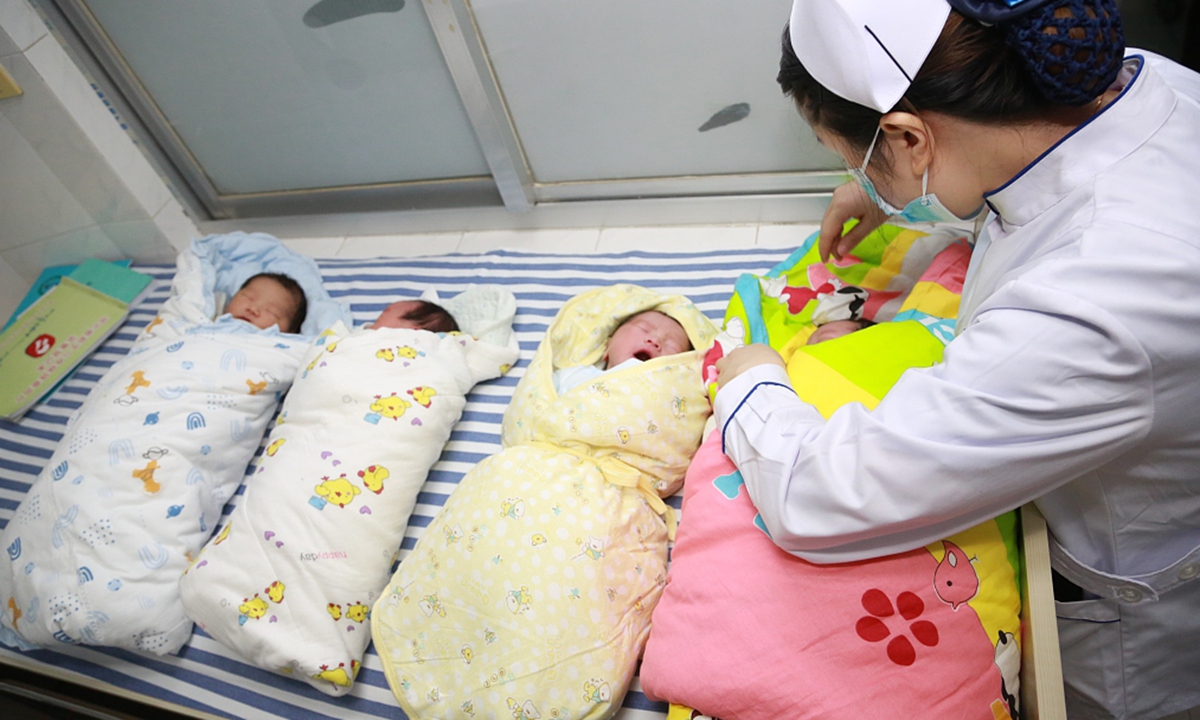
Third-child policy Photo:VCG
Mothers in Beijing and Shanghai are expected to be granted an extra 30 days of maternity leave, according to revised regulations on population and family planning approved on Thursday and Friday in response to China's efforts to encourage childbirth.
At the 37th meeting of the Standing Committee of the 15th Shanghai Municipal People's Congress held on Thursday, the decision to amend the population and family planning regulations in Shanghai was approved. Beijing followed suit on Friday and approved a revised regulation to extend mothers' maternity leave, meaning both municipalities offer maternity leave of just over five months, 60 days more than the national standard mandated in law, and 30 days more than before.
Provincial regions in the Chinese mainland are able to set their own parental leave standards.
Fathers in Beijing will be entitled to 15 days of paternity leave, according to the revised population and family planning regulations in Beijing. Parents will be entitled five days of parental leave every year while the child is under the age of 3. Meanwhile, the amount of financial assistance for parents whose only child is injured, disabled or died in an accident, shall be raised to no less than 10,000 yuan ($1,565) from 5,000 yuan previously.
In Shanghai, the amended regulations clarify that one couple can have three children. Along with the 98-day maternity leave that mothers are entitled to according to the national regulations, they will be granted an extra 30 days of maternity leave, a total of 60 extra days, up from 30 days previously.
Couples in Shanghai who have given birth in accordance with the items of the regulations are entitled to five days of parental leave each year until the child reaches 3 years old. Couples shall be paid at a normal level during their parental leave.
With a resident population of more than 24.87 million, Shanghai has witnessed a steady population growth from 2010 to 2020, with an annual growth rate of 0.8 percent, but it does contrast with the 3.4 percent annual growth rate from 2000 to 2010, according to the municipal government in May.
With continuous development, especially the influence of the change of the concept of fertility, a low fertility rate has become a problem in most developed countries, Zhu Min, director of the Shanghai Municipal Bureau of Statistics, said during a press conference held in May.
At present, there are about 3.8 million one-child families in Shanghai, with about 7.6 million parents with only one child. The regulations also noted that rewards and assistance for those families will continue.
East China's Zhejiang Province also approved the amended regulations on population and family planning, which took effect on Thursday. Along with the 98-day maternity leave based on national regulations, mothers will be entitled an extended 60 days of maternity leave when they give birth to their first child and 90 days extra for their second and third children.
Couples in Zhejiang will be entitled to 10 days of parental leave annually until their child turns 3. Their salary, bonuses and other welfare entitlements shall be paid as usual during their leave, according to the revised regulations.
Mothers in Northwest China's Qinghai Province will be entitled 188 days of maternity leave based on a revised regulation approved on Wednesday. Couples can have marriage leave for 15 days.
Beijing, Shanghai and Zhejiang and Qinghai provinces are among the regions that have launched detailed measures to support childbirth recently. On Tuesday, Central China's Henan Province announced it will revise its regulations on population to legitimize the third-child policy and roll out support measures.
More than 10 provinces have added parental leave to their amended family planning regulations including Jiangxi and Sichuan, according to media reports.
China has been gradually adjusting its one-child family planning policy. It partially implemented the two-child policy in 2013 and fully promoted it in 2015. China in July this year unveiled details of the third-child policy and support measures, including more nurseries and flexible work leave.




